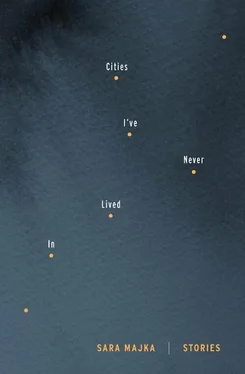The church ran a day care. During nap time, the children slept on rolled-out mats, without any pillows or blankets. They slept in rows just like that, and made crafts from colored pom-poms — making rainbows that hung from string. I liked the day care: the colored pom-poms, the snacks in Dixie cups, the day they decorated their bikes in the parking lot.
On Sundays I went to church and Richard stayed in bed, neither of us believers, but I was moved by the neighborliness of the event. The deacon had long flowing hair and flowing robes. I was afraid of her equanimity and cheerfulness, but the pastor — a thin, thinning-haired woman with hurt eyes — it was natural to like her for the stinginess of her gifts. It was the deacon who always read stories during the children’s service, which was the second one of the day, the one that I went to. The pastor sat behind the altar watching as if she had been ordered to stay away.
Back then a child — a little girl named Ruth Simmons — was taken from the Pilgrim day care. After class, she had gone out in the hall with the other children and gone up to an adult. They left together, and though the teacher hadn’t recognized the adult, Ruth was so natural that the teacher had thought nothing of it. I don’t remember this time well, except for the pastor, not in robes anymore, but in a linen skirt and blouse in the parking lot, facing the sky as if looking for God. I would say I didn’t believe in God back then, but when I thought of God I thought of the force the woman was communicating with. As if God was everything that wasn’t her. To her we must be God, I thought, though I wasn’t sure what I meant. Mostly back then I thought of how I wasn’t good enough at any one thing. I had by then loved so much that hadn’t loved me back. How was so much inequality possible? Who was loved more than it loved back? Perhaps only children. Perhaps that’s why the death of a parent is so painful.
I knew little about this lost child. I kept meaning to look her up online, to see whether she was found and how. If she had been abused, left again to face an incomprehensible world. Or if some lunatic had simply tried to adopt her in the most direct way. I’ve always felt that parents, too, take children from some other place. I don’t remember the parents from this time. The police were around. They knocked on our door. Richard told them about the place and about ourselves. That we had lived in the apartment for eight months and that he worked at the college. We hadn’t seen anything, had always been happy there, though it was true, people came in and out because of the hostel, but he had never seen a bad sort. Who knows what he told the police; he had a sensible voice. Early on he thought he might be in radio. They looked about our bushes. Then knocked on the neighbor’s door. You could hear the muffled voice of authority and gentle response. Not the parents, or reporters, or a change in the events of the church — the only thing I remembered was the change in the pastor. In the habit she developed of coming out the back door, the one for the hostel, and staring toward the apartments, her hair blowing.
For years after my divorce I saw a therapist who tried, carefully and slowly, to get me to talk about my father. Because we worked together for so many years, and because those times were spent traveling back — as if in a tube, a dimly felt groping for something remembered — to my childhood, I became girl-like in her presence. I became frightened when I found I had no firsthand memories. All my memories were remembered memories. In this way, I disliked talking about them. There was never a way to be certain what had happened. My father took me out on the beach. Or we were walking along the shoreline; the tide must have been out because the sand was vast, shimmering. Other people were also on the shoreline and they were far away. My father found a horseshoe crab and flipped it with a stick to show me there was nothing inside of it, but this might have been another time. But he was trying to teach me nature in a meticulous way. This probably happened. But the story I was telling was not the story itself. It was a story I knew because I had told it several times, as a description of my father, a description of his thoroughness.
There was grief, of course, in all of it. What was the point in those years spent with that woman? To access the grief, to claim it as my own and be able to move on with it? But I didn’t want to do it. I turned away from the exercises in memory after a time. I simply loved her. She was diminutive. She hardly filled her chair. When she died of a brain hemorrhage I ended up calling a crisis hotline. It was weeks after the funeral. It was the first time I had ever done that. I called not because life had become unendurable, but because I wanted to know what to do in case it became unendurable. They told me I could call the hotline any time, and, if it became necessary, that they had a list of places where I could go. After that was three days spent at the Bellevue inpatient clinic with a doctor named Kurt, and then an outpatient psychiatrist I visited every month for my prescription whom I did not care for; she always got my appointments mixed up and made me wait in the hall and then filled out incorrect times on my form to make my wait appear shorter. There was a park, though, some blocks from the hospital and a Thai place that had a lunch special and the most efficient service I had ever come across.
When the girl Ruth vanished one day — never to return again — I felt it had something to do with the travelers. Not that Ruth had been taken by the travelers — as the police had carefully questioned the hostel workers and those who had come and stayed — but that Ruth was one of the travelers, that she had never been with us to stay. I walked the hallways at night and thought of why I traveled, of the feeling of suspension, of impending arrival. I understood the truth, that something terrible had taken place. I shouldn’t romanticize child abductions, though what dizzying confusion it is, with those AMBER alerts texted to you at three in the morning. A child taken in a copper-colored sedan in an area of the city so far away as to be a distant land. You picture the car racing along with a child, not to anywhere horrible or real, but as if to the moon. And you stand at your window in wonderment at this luminous world. I felt the loss of the child — perhaps as a representation, of the little girl my father had left, of the little girl I had never been able to become, or of the little girl I wanted to have. These are the ways we might have talked in therapy, and I had participated willingly, hoping that it might help in some way, but mostly because I liked to talk with that gentle woman.
There were questions: Why would evil happen to children? How do we understand it and continue believing? Is there a way we can understand it? I asked the pastor these questions. I didn’t know how to tell her about the travelers. I found, in the way I would find with my therapist years later — as you often find with someone you love — a common world that felt manageable. I wanted to but didn’t ask: Do we get to go home? Why did it seem more likely for children, as if they were closer to the beginning when it came time to return? Maybe we had gone too far.
She didn’t garden and I rarely saw her except when she was in front of the congregation on Sundays. She was never memorably eloquent. How does one get to be known as good at that job? What sense of herself or her profession did she have? I used to wonder about this. She told stories during her sermon; in one, she was in a grocery store, in the fruit aisle, faced with so many inexplicable choices. She must have tied this into faith, though I forget the moves she made. Richard disliked the church and found her interminable. I was riveted, but didn’t say it. She hates being in front of people, I thought. I also couldn’t understand being a true believer. It seemed the most fantastical thing, to be so full of belief in the mystical that you would go up front to teach others. Her face, the pinch of it, and her weary eyes made her seem too tired to actually be a believer.
Читать дальше












